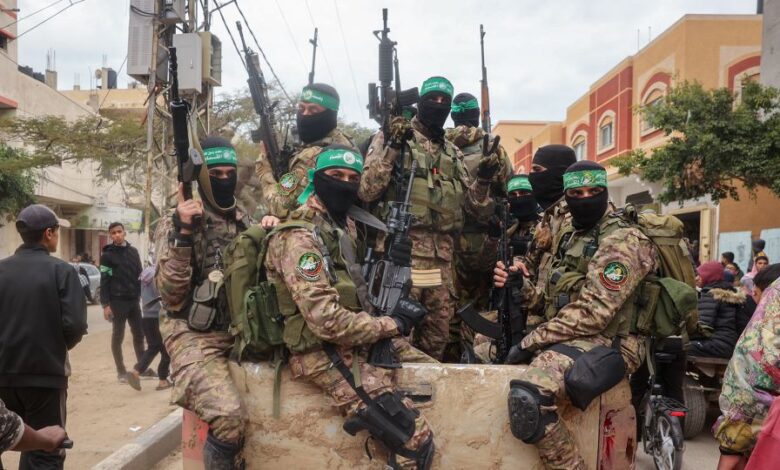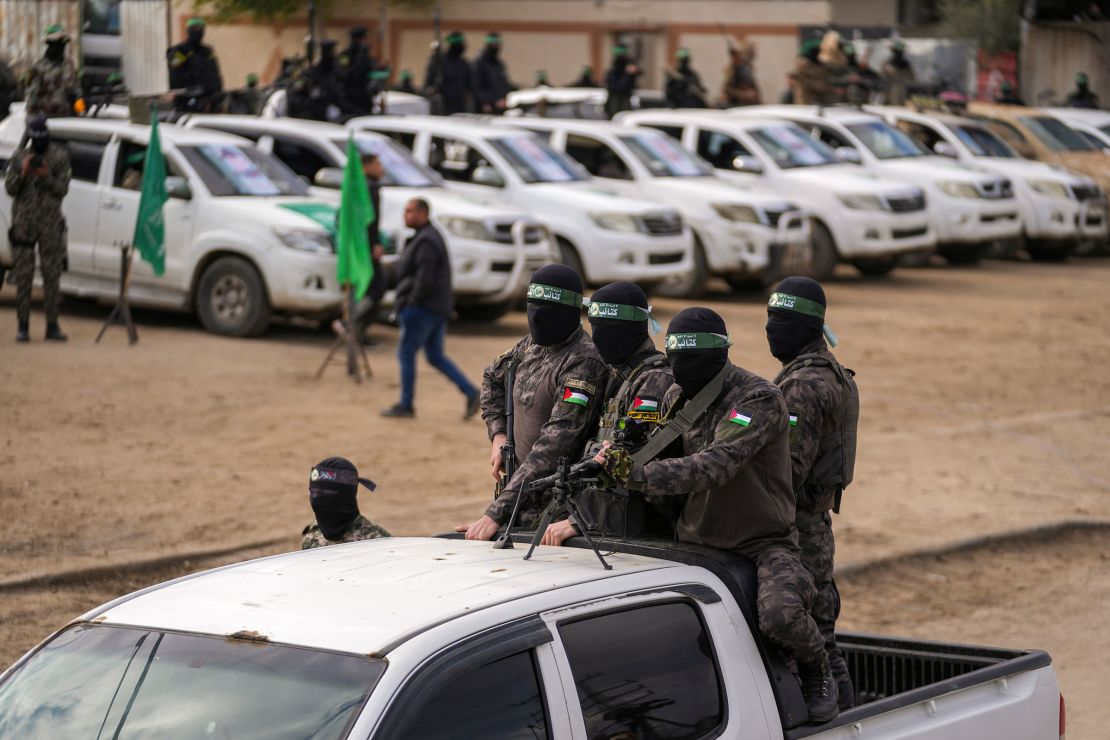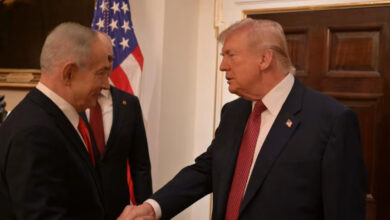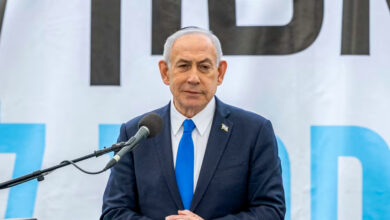
Hamas has threatened to postpone the next hostage release scheduled to take place in Gaza on Saturday “until further notice,” accusing Israel of breaking the ceasefire deal.
Israel described the threatened postponement as a “complete violation of the ceasefire” and called on the Israeli military to prepare for “any possible scenario” in Gaza.
US President Donald Trump, meanwhile, urged Israel to cancel the ceasefire and “let all hell break out” unless Hamas release all remaining hostages by Saturday, a demand that goes beyond the deal hashed out between the militant group and Israel and injects fresh uncertainty into an already fragile agreement.
In a post on X published before Trump spoke, Abu Obeida, spokesman for Hamas’ armed wing the Qassam Brigades, said that the handover of the hostages “who were scheduled to be released next Saturday … will be postponed until further notice, and until the occupation commits to and compensates for the entitlements of the past weeks retroactively.”
He added: “We affirm our commitment to the terms of the agreement as long as the occupation commits to them.”
However, in a later statement, Hamas said there was still an opportunity for the release to go forward as planned. It said the move “serves as a warning” to Israel and was meant to pressure it into “fully honoring” the terms of the ceasefire deal.
“By issuing this statement five full days ahead of the scheduled prisoner handover, Hamas aims to grant mediators sufficient time to pressure the occupation to fulfill its obligations,” the statement read. “This also leaves the door open for the exchange to proceed as planned, provided the occupation complies.”
Abu Obeida detailed various alleged violations of the agreement by Israel over the past three weeks, including “delaying the return of the displaced to the northern Gaza Strip, targeting them with shelling and gunfire in various areas of the strip, and not allowing the entry of relief supplies in all their forms according to what was agreed upon.” Hamas also accused Israel of not allowing tents, prefabricated houses, fuel, or rubble-removing mechanisms into the strip. It alleged Israel was also delaying the entry of essential medicines and hospital supplies.
A diplomat with knowledge of the ceasefire talks claimed to CNN that the UN, Qatar and other countries had requested to deliver temporary shelters to Gaza but Israel turned them down. CNN has reached out to Israeli officials regarding the diplomat’s claim.
Military on high alert
In response to Hamas’ threat to postpone the hostage release, Israeli Defense Minister Israel Katz said he had instructed the country’s military to “prepare at the highest level of alert for any possible scenario in Gaza.”
The defense minister described Hamas’ move as a “complete violation of the ceasefire agreement and the deal to release the hostages.”
The Israel Defense Forces (IDF) said later it was “raising its level of readiness in southern Israel and postponing leave for combat soldiers” and would reinforce the area to enhance its “readiness for various scenarios.”
An Israeli official told CNN Monday that Prime Minister Benjamin Netanyahu was consulting his security leadership team and that a political-security cabinet meeting scheduled for 7 p.m. on Tuesday local time had been moved up to the morning hours due to Hamas’ announcement.
Speaking to reporters in the Oval Office, US President Trump said as far as he was concerned, “if all of the hostages aren’t returned by Saturday at 12 o’clock – I think it’s an appropriate time – I would say, cancel (the ceasefire) and all bets are off and let hell break out.”
Pressed on what “all hell” might entail in Gaza, Trump demurred, adding “You’ll find out, and they’ll find out – Hamas will find out what I mean.”
The US leader also expressed skepticism over how many hostages remain alive to release, saying, “I think a lot of the hostages are dead.”
Trump’s statement was just the latest in a series of inflammatory remarks about Gaza in recent days, including proposals to permanently displace Palestinians from the strip. On Sunday, he doubled down on his plans for the US to redevelop Gaza, calling the war-torn enclave as a “big real estate site.”
It’s not clear how Trump’s proposals would be carried out, or if he even has the authority to do so – but they have bolstered Netanyahu and Israel’s far-right, and opened a host of legal questions.
Opponents and many analysts have long warned the forcible removal of a population would breach international law.
“I think it’s important to state very clearly upfront, there is no legitimate form of ethnic cleansing. It doesn’t matter if the proposal comes from the president of the United States,” said Khaled Elgindy, an expert on Middle East affairs and visiting scholar at Georgetown University.
“I think the Arab states’ rejection of this is on that basis – it’s that you cannot remove Palestinians forcibly from their homeland. In addition to being illegal and immoral, it would be deeply destabilizing,” he added, referring to countries like Jordan and Egypt that have flatly rejected Trump’s plan.

‘Time is of the essence’
Hamas’ threat to postpone the next hostage release represents a serious challenge to the fragile ceasefire between Israel and Hamas – but it does not guarantee the deal’s collapse.
The threat comes at an extraordinarily sensitive time in Israel, where the images of three emaciated hostages released on Saturday have been seared into the public conscience and are driving a sense of urgency about those still in captivity in Gaza.
The Israeli government has also been dragging its feet on reengaging in negotiations with Hamas over extending the current ceasefire and right-wing politicians are already calling for a return to the war in Gaza.
Underlining the high stakes involved for the Israeli government, protesters gathered in Tel Aviv on Monday night, calling for all remaining hostages to be released and accusing Netanyahu of sabotaging the deal.
“The Israeli government just torpedoed the deal. The prime minister just torpedoed the deal, and the hostages are not expected to return on Shabbat. We cannot accept this,” Danny Elgarat, the brother of 69-year old Itzhak Elgarat, said in a video seen by CNN. Itzhak was supposed to be released under the first phase of the Gaza deal, according to the Israeli government.
While Hamas’ threat is serious, this is not the first time complaints have been raised to the mediators. Hamas and Israel have accused each other of violating the agreement throughout the first phase of the deal. Previous complaints have subsequently been resolved.
An Israeli threat to delay the return of Palestinians to northern Gaza – which it followed through on – was ultimately resolved in discussions with the mediators, for example.
Following the news, the Hostage and Missing Families Forum said it had requested urgent assistance from mediating countries to “help restore and implement” the ceasefire deal.
“We stand with the Israeli government and encourage maintaining the conditions that will ensure the successful continuation of the agreement, leading to the safe return of our 76 brothers and sisters,” the forum said.
“Recent evidence from those released, as well as the shocking conditions of the hostages released last Saturday, leaves no room for doubt,” the statement continued. “Time is of the essence, and all hostages must be urgently rescued from this horrific situation.”

Dozens of hostages still in Gaza
Hamas released three hostages on Saturday in the latest hostage exchange since a ceasefire went into effect on January 19.
In exchange, Israel released 183 Palestinian prisoners, of whom 18 were serving life sentences. The majority had been detained in Gaza since October 7 and had no public charges against them.
Hamas has now released a total of 16 Israeli hostages as part of the first phase of the ceasefire agreement, of a total of 33 promised at staggered intervals during this stage. Eight of those 33 are dead, according to the Israeli government.
Following the release of the three hostages on Saturday, Hamas and its allies still hold a total of 73 people taken from Israel on October 7, 2023, of 251 initially taken. Three additional hostages, held captive since 2014, are still in Gaza.
The question now: How will the Israeli government react to Hamas’ threat?
This is a developing story and will be updated.




